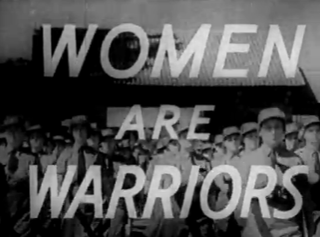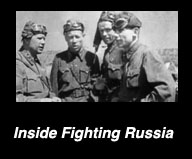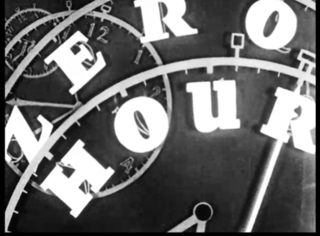
Fighting Norway is a 10-minute 1943 Canadian documentary, part of the wartime Canada Carries On series of short films produced by the National Film Board of Canada. The film was directed by Sydney Newman, one of a number of shorts that were intended for theatrical release.

Warclouds in the Pacific is a 20-minute 1941 Canadian documentary film, part of the Canada Carries On series of short films by the National Film Board of Canada. The film was produced, written and directed by Stuart Legg and narrated by Lorne Greene. Warclouds in the Pacific, which warned of an imminent Japanese attack, was released just one week before the attack on Pearl Harbor.

Wings on Her Shoulder is a 10-minute 1943 Canadian documentary film, made by the National Film Board of Canada (NFB) as part of the NFB's The World in Action series. The film, directed by Jane Marsh, depicts the role of the Woman's Division in the Royal Canadian Air Force (RCAF) during the Second World War, who freed up men for flying duties.

Look to the North is a 22-minute 1944 Canadian documentary film, made by the National Film Board of Canada (NFB) as part of the wartime Canada Carries On series. The film was produced and directed by James Beveridge. The title of the film's French version is Vers le Nord.

The Home Front is a 10-minute 1940 Canadian documentary film, made by the National Film Board of Canada (NFB) as part of the wartime Canada Carries On series. The film was produced and directed by Stanley Hawes.

Women Are Warriors is a 14-minute 1942 Canadian documentary film, made by the National Film Board of Canada (NFB) as part of the wartime Canada Carries On series, and dealt with women in war. The film was produced by Raymond Spottiswoode and written and directed by Jane Marsh. The film's French version title is Les Femmes dans la mêlée.

Inside Fighting Canada is an 11-minute 1942 Canadian documentary film, made by the National Film Board of Canada (NFB) as part of the wartime Canada Carries On series. The film, written and directed by Jane Marsh and produced by James Beveridge, was an account of the Canadian military during the Second World War. The film's French version is titled Canada en guerre.

Inside Fighting Russia is a 1942 22-minute Canadian short documentary film produced by the National Film Board of Canada (NFB) for distribution by United Artists, as part of the wartime The World in Action series. The film documents Russia's fight against Nazi Germany during the Second World War. Inside Fighting Russia is produced by Stuart Legg, and narrated by Lorne Greene. The film's French version title is La Russie sous les armes.

The Battle for Oil is a 19-minute 1942 Canadian documentary film, made by the National Film Board of Canada (NFB) as part of the wartime Canada Carries On series. The film was produced by Raymond Spottiswoode and directed and edited by Stuart Legg.The Battle for Oil describes the strategic value of oil in modern warfare. The film's French version title was La Bataille du pétrole.

Letter from Aldershot is a nine-minute 1940 Canadian documentary film, made by the National Film Board of Canada (NFB) as part of the wartime Canada Carries On series. The film was directed by John Taylor and produced by Stuart Legg.

Letter from Camp Borden is a 17-minute 1941 Canadian documentary film, made by the National Film Board of Canada (NFB) as part of the wartime Canada Carries On series. The film was directed by Raymond Spottiswoode and produced by Stuart Legg. Letter from Camp Borden chronicles the experiences in 1941 of a number of soldiers training at the Canadian Army's Camp Borden during wartime.

The Gates of Italy is a 21-minute 1943 Canadian documentary film, made by the National Film Board of Canada as part of both the wartime Canada Carries On and The World in Action series. The film was written, directed and produced by Stuart Legg and Tom Daly. The Gates of Italy describes the last days of Benito Mussolini's rule over Italy in 1943 during the Second World War.

Trans-Canada Express is a 20-minute 1944 Canadian documentary film, made by the National Film Board of Canada (NFB) as part of the World War II Canada Carries On series. The film was produced by Sydney Newman and directed by Stanley Hawes. Trans-Canada Express documents the importance of the railroad in Canada, emphasizing the use of rail transport during World War II. The film's French version title is D'un océan à l'autre.

Back to Jobs is a nine-minute 1945 Canadian documentary film, made by the National Film Board of Canada (NFB) as part of the postwar Canada Carries On series. The film describes soldiers in the Second World War returning home and back to a civilian life. The French version title of Back to Jobs is Nos soldats reviennent .

The Voice of Action is a 16-minute 1942 Canadian documentary film, directed by James Beveridge and produced by Raymond Spottiswoode. The short film was made by the National Film Board of Canada (NFB) as part of the wartime Canada Carries On series. The Voice of Action describes the importance of the Canadian Broadcasting Corporation (CBC) in the Second World War. The French version title of The Voice of Action is Dynamisme des ondes.

The War for Men's Minds is a 21-minute 1943 Canadian documentary film, made by the National Film Board of Canada (NFB) as part of the wartime The World in Action series. The film was produced by Stuart Legg. The film describes the impact of propaganda from the Axis powers in 1943, during the Second World War. The French version title is À la conquête de l'esprit humain.

Letter from Overseas is a 15-minute 1943 Canadian documentary film, made by the National Film Board of Canada (NFB) as part of the wartime The World in Action series. The film describes the training and operational use of Canadian Army soldiers in 1943 during the Second World War.

Pincer on Axis Europe is a 20-minute 1943 Canadian documentary film, made by the National Film Board of Canada as part of the wartime Canada Carries On series. The film describes the Allied invasion of North Africa in 1942 during the Second World War.

Zero Hour is a 22-minute 1944 Canadian documentary film, made by the National Film Board of Canada (NFB) as part of both the wartime Canada Carries On and The World in Action series. The film was produced by Stuart Legg. Zero Hour describes the Axis and Allied invasions that have taken place during the Second World War.

Air Cadets is a 15-minute 1944 Canadian documentary film, made by the National Film Board of Canada (NFB) as part of the wartime Canada Carries On series. The film describes the Air Cadet Movement in 1944 during the Second World War. Air Cadets was directed by Jane Marsh, who was also the writer and editor on the production. The film's French version title is Les Cadets de l'air.




















